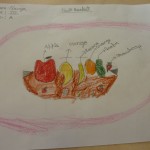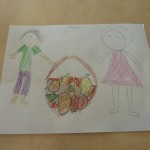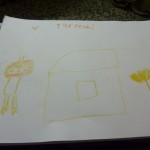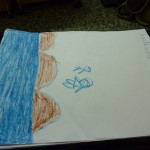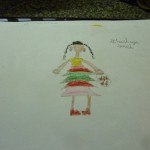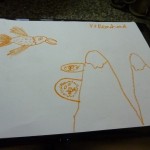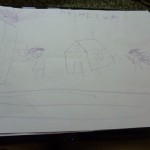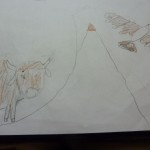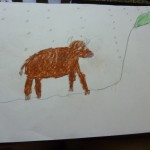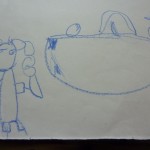[Mum in Orange Saree and Auntie in Green]
My mum was in no way orthodox or deeply religious when we were young, or for that matter now. She is spiritual and devoted to her religion – but she is also a product of her time.
Most of my Mum’s friends were local women who were brought together in social work and she didn’t really mix much with the neighbours. Don’t get me wrong, we were in a colony of bank employees, we all liked each other and the kids like me hung out with other colony kids, but my Mum was not the “Best friend” type. Oh I just realized why I’m like that.
Anyway, this was the time of the Srilankan Civil War at its worst. The Tamils were not only fighting the federal Sinhala government , but were also fighting amongst themselves. Refugees came into India in droves, especially to South India where the political climate was favourable.
We had new neigbours two doors down. We lived in the first floor and someone moved into the first floor flat two doors down. The house in the middle didn’t have a first floor – so I could watch the comings and goings of the new neighbours. Opposite to the new neighbor’s flat was our usual hangout – another bank employee’s house and we sat in their terrace and watched them unpack and move in.
Everyone speculated including us, the kids. Their accent wasn’t local. Were they from Kerala, the south-west of India. They sounded different, dressed different. They were new to this part of the world. And then an old lady with just one arm came out of the car. That was big news and we speculated more.
The next thing that was different, was this bunch was friendly. Not in a “I’m new to your neighbourhood” way. In a genuine way. They invited us to their place and they wanted to talk to us. And this was not the health and safety, don’t talk to strangers time – this was more in the early 80s when we walked around in our pajamas on the streets. (Well, I did and I was sure was being laughed at).
I was drawn to their smiles. It reached their eyes. People tell me I do that too. Maybe I got it from them. Anyway, I digress. I made friends first. I went in to their home and talked to them. Gleaned information. They were from Sri Lanka, my mum still says Ceylon. They were refugees. But not regular refugees – they were political refugees. Because one of the brothers (who wasn’t with them) was a liberation leader. The old lady was shot at by the army. The older brother was in jail for many years for not revealing his brother’s whereabouts. My imagination was ignited. Their Tamil cause was mine too.
But the most important thing that happened was that my Mum was drawn to them too. Slowly the family became friends. My mum and Kanaka Auntie (we never called her that, we called her Ceylon Aunty and my Mum called her Ceylonee) started doing things together – the temples first and then for coffee and then a meal. They talked hours on end and they got on like fire and petrol. They both had irreverent humour and they loved making fun of stuck-up people. My mum was impressed with auntie’s knowledge and experience – she understood what it took to leave behind a homestead, a farm and a big house and having to flee for life.
[They must have been making fun of someone else or each other.]
Their kids were friendly and genuinely nice. My mum had a friend for life. Well, she thought she did. We were family – we had broken barriers mentally to be recognized with people who were different from us in more ways than one. My Mum managed to get Auntie approved amongst her sisters and in-laws. Everyone knew Mum’s best friend was Ceylon Auntie. And she in turn became the advisor and listener to many of Mum’s relatives and friends.
When I went home this April. Auntie couldn’t come to see me. She was ill. The first time she hadn’t turned up the day I went home. She called and sent her “freedom-fighter” husband with some home-made rice noodles. I insisted I wanted to visit. They lived a few streets away now. We went for a visit and we had an hour talking about this and that. Auntie was ill – but her husband was talking to my Mum about her recent bout of illness and giving her advice. Every one in their family have always been generous with their warmth, their smiles and their attitude. They had so little, yet they shared. They worked hard and they smiled a lot. No wonder my Mum loved to be part of that fold.
Ceylon Auntie, passed away yesterday, after a month of hospitalization. A coma she wouldn’t come out of. She had braved the Sinhala Army and a foreign country. She had braved her husband’s jail term and her mother-in-laws escape across the fields, being shot at by the army. But she finally gave up.
My mum and Dad have been talking about her for weeks now. They were so worried. My Dad couldn’t contemplate not having her in our lives. He wasn’t normally very involved in things like hospitals and family functions. But he went to the hospital every other day to see her and be with her husband.
Our family has lost a friend, my Mum has lost a sister and we are all somehow a little less than we were yesterday. But the only way I know how to carry on, is be like her –be generous even when you have nothing to give and be happy even if life has not given you reason to.








